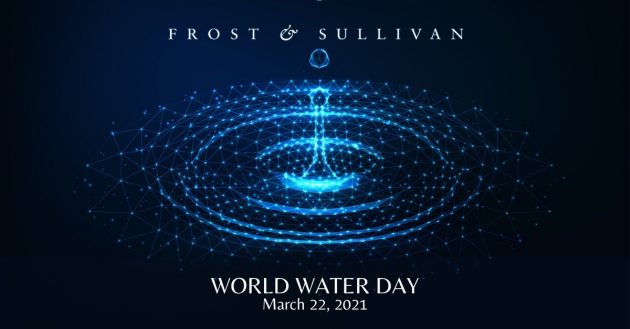
Experts analyze regional tactics for water and sanitation for all by 2030
by CM Staff

On World Water Day, explore key highlights on new technologies and business models leveraged by every region

SANTA CLARA, Calif. — The COVID-19 pandemic has significantly affected the water sector. Operational resilience and economic sustainability have become key focal points of investments. The lockdowns across the globe have severely disrupted supply chains and labor availability for production; both factors have significantly hit the growth of the water market across the globe.
To celebrate World Water Day, Frost & Sullivan experts raise awareness on the global water crisis and share insights on how each region is leading the charge towards water and sanitation for all by 2030. The global water and wastewater market is expected to bounce back to pre-pandemic levels by 2021 on the back of favorable policies that would enable fresh investments which would be aimed at adopting solutions that can improve resilience, sustainability, and circular economy.
“Amongst the many segments in the global water market, the municipal water and wastewater market projects as the sector with the highest social value as it has a direct impact on everyone, cutting across socio-economic backgrounds,” said Paul Hudson, Energy & Environment Industry Analyst at Frost & Sullivan, in a prepared statement. “They are being considered crucial as there is a growing need to re-strategize in order to ensure sustainability and resilience. Implementation of smart solutions for system optimization is set to surge as the pandemic has exposed a chink in the armor that needs to be rectified.”
Frost & Sullivan’s key findings across regions in the municipal water and wastewater market include:
- Asia-Pacific: Water reclamation and desalination projects will be key focal points of new investments in APAC. While India is primarily focusing on extending sanitation coverage with the aim of cleaning up polluted water bodies, Australia will focus on expanding its water reclamation projects to mitigate the effects of drought. There will be a high demand for smart monitoring and analytics platforms in ASEAN countries.
- Europe: Favorable regulatory policies empower the adoption of smart asset management solutions and advanced treatment technologies for the removal of wastewater nutrients. While France, the UK, and Germany will continually invest in smart metering solutions enabled by AMI communication modules, Central and Eastern European countries will increase their investments to improve sanitation coverage.
- North America: Data analytics platforms that provide predictive intelligence on a holistic level, which includes treatment assets, resource management, and efficiency management, will witness high demand among utilities in North America due to increasing regulatory scrutiny and tightening budgets.
- Middle East and Africa: Among GCC countries, there is renewed focus and investment on desalination technologies that require low energy and those that can be run on solar energy. African countries, especially South Africa, Nigeria, Kenya, Egypt, and Namibia, are shifting their focus to sustainable wastewater treatment.
- Latin America: Private participation has led to major investments in water supply and reclamation projects in the region. A special emphasis will be on rehabilitating and expanding wastewater treatment facilities, especially in countries like Brazil, Colombia, and Mexico. Also, more LATAM countries are opening up to implementing water and wastewater projects through public–private partnerships (PPPs). New PPP-based projects can be expected in countries like Mexico, Bolivia, Argentina, Colombia, Peru, and Brazil.